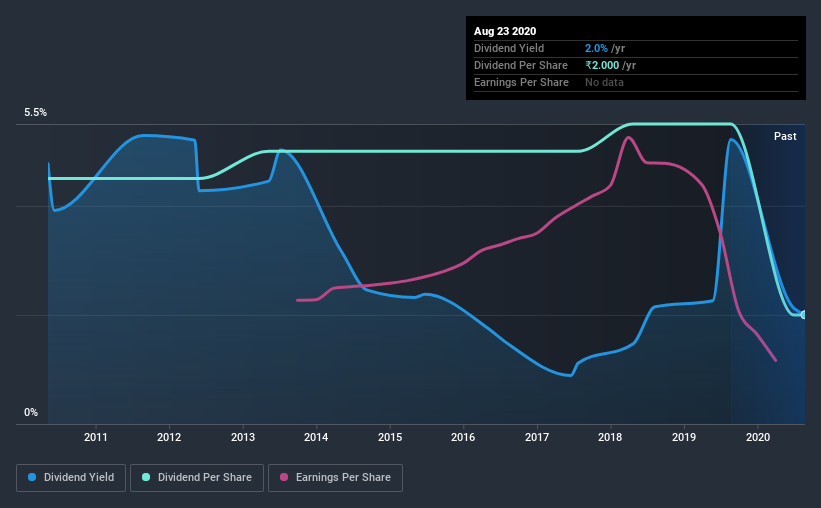- India
- /
- Diversified Financial
- /
- NSEI:GICHSGFIN
Would GIC Housing Finance Limited (NSE:GICHSGFIN) Be Valuable To Income Investors?

Dividend paying stocks like GIC Housing Finance Limited (NSE:GICHSGFIN) tend to be popular with investors, and for good reason - some research suggests a significant amount of all stock market returns come from reinvested dividends. If you are hoping to live on the income from dividends, it's important to be a lot more stringent with your investments than the average punter.
A 2.0% yield is nothing to get excited about, but investors probably think the long payment history suggests GIC Housing Finance has some staying power. That said, the recent jump in the share price will make GIC Housing Finance's dividend yield look smaller, even though the company prospects could be improving. Some simple research can reduce the risk of buying GIC Housing Finance for its dividend - read on to learn more.
Explore this interactive chart for our latest analysis on GIC Housing Finance!

Payout ratios
Dividends are typically paid from company earnings. If a company pays more in dividends than it earned, then the dividend might become unsustainable - hardly an ideal situation. So we need to form a view on if a company's dividend is sustainable, relative to its net profit after tax. In the last year, GIC Housing Finance paid out 24% of its profit as dividends. Given the low payout ratio, it is hard to envision the dividend coming under threat, barring a catastrophe.
Remember, you can always get a snapshot of GIC Housing Finance's latest financial position, by checking our visualisation of its financial health.
Dividend Volatility
Before buying a stock for its income, we want to see if the dividends have been stable in the past, and if the company has a track record of maintaining its dividend. GIC Housing Finance has been paying dividends for a long time, but for the purpose of this analysis, we only examine the past 10 years of payments. The dividend has been cut on at least one occasion historically. During the past 10-year period, the first annual payment was ₹4.5 in 2010, compared to ₹2.0 last year. The dividend has shrunk at around 7.8% a year during that period. GIC Housing Finance's dividend hasn't shrunk linearly at 7.8% per annum, but the CAGR is a useful estimate of the historical rate of change.
When a company's per-share dividend falls we question if this reflects poorly on either external business conditions, or the company's capital allocation decisions. Either way, we find it hard to get excited about a company with a declining dividend.
Dividend Growth Potential
With a relatively unstable dividend, and a poor history of shrinking dividends, it's even more important to see if EPS are growing. GIC Housing Finance's earnings per share have shrunk at 15% a year over the past five years. A sharp decline in earnings per share is not great from from a dividend perspective, as even conservative payout ratios can come under pressure if earnings fall far enough.
Conclusion
Dividend investors should always want to know if a) a company's dividends are affordable, b) if there is a track record of consistent payments, and c) if the dividend is capable of growing. Firstly, we like that GIC Housing Finance has a low and conservative payout ratio. Earnings per share are down, and GIC Housing Finance's dividend has been cut at least once in the past, which is disappointing. GIC Housing Finance might not be a bad business, but it doesn't show all of the characteristics we look for in a dividend stock.
Companies possessing a stable dividend policy will likely enjoy greater investor interest than those suffering from a more inconsistent approach. At the same time, there are other factors our readers should be conscious of before pouring capital into a stock. For example, we've identified 5 warning signs for GIC Housing Finance (1 can't be ignored!) that you should be aware of before investing.
Looking for more high-yielding dividend ideas? Try our curated list of dividend stocks with a yield above 3%.
If you’re looking to trade GIC Housing Finance, open an account with the lowest-cost* platform trusted by professionals, Interactive Brokers. Their clients from over 200 countries and territories trade stocks, options, futures, forex, bonds and funds worldwide from a single integrated account. Promoted
If you're looking to trade GIC Housing Finance, open an account with the lowest-cost platform trusted by professionals, Interactive Brokers.
With clients in over 200 countries and territories, and access to 160 markets, IBKR lets you trade stocks, options, futures, forex, bonds and funds from a single integrated account.
Enjoy no hidden fees, no account minimums, and FX conversion rates as low as 0.03%, far better than what most brokers offer.
Sponsored ContentNew: Manage All Your Stock Portfolios in One Place
We've created the ultimate portfolio companion for stock investors, and it's free.
• Connect an unlimited number of Portfolios and see your total in one currency
• Be alerted to new Warning Signs or Risks via email or mobile
• Track the Fair Value of your stocks
This article by Simply Wall St is general in nature. It does not constitute a recommendation to buy or sell any stock, and does not take account of your objectives, or your financial situation. We aim to bring you long-term focused analysis driven by fundamental data. Note that our analysis may not factor in the latest price-sensitive company announcements or qualitative material. Simply Wall St has no position in any stocks mentioned.
*Interactive Brokers Rated Lowest Cost Broker by StockBrokers.com Annual Online Review 2020
Have feedback on this article? Concerned about the content? Get in touch with us directly. Alternatively, email editorial-team@simplywallst.com.
About NSEI:GICHSGFIN
Average dividend payer with acceptable track record.
Similar Companies
Market Insights
Community Narratives



